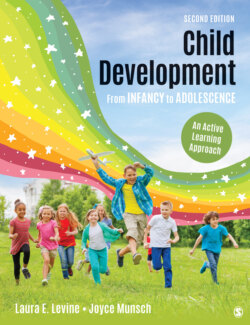Читать книгу Child Development From Infancy to Adolescence - Laura E. Levine - Страница 123
На сайте Литреса книга снята с продажи.
Evolutionary Theory: Ethology
ОглавлениеCharles Darwin’s theory of evolution is based on the idea that living things that adapt to their environment are more likely to pass on their genes to the next generation. His focus was largely on physical characteristics, but his basic idea that human behavior that has adaptive value will persist is central to the field called ethology. Konrad Lorenz (1903–1989) is considered the father of modern ethology, which is the study of the adaptive value of animal and human behavior in the natural environment. As a zoologist studying animal behavior in Munich, Germany, Lorenz found that ducks and geese would immediately follow their mothers after they were born. This automatic behavior, called imprinting, is adaptive because the mother provides her offspring with food and protection from predators. Lorenz showed that this behavior was innate and not learned. When he removed the mother goose and substituted himself, the newly hatched geese responded to him in the same way they would have responded to the mother goose: by following him.
Ethology: The study of the adaptive value of animal and human behavior in the natural environment.
Imprinting: In ethology, the automatic process by which animals attach to their mothers.
Konrad Lorenz and imprinting. Konrad Lorenz observed the behavior of geese (left) and demonstrated the presence of imprinting by removing the mother goose and substituting himself. The goslings then treated him as if he were their mother (right).
Jupiterimages/Photos.com/Thinkstock
Nina Leon/ Contributor via Getty Images
Some researchers attempted to apply the idea of imprinting to human behavior. They claimed that infants must have skin-to-skin contact with their mother within the first few hours after birth for bonding, or love, to develop. Like many attempts to apply animal behavior to humans, this has turned out not to be the case (Streep, 2015). Although animal behavior can give us some ideas about human behavior, the direct application of one to the other is usually too simplistic. Although there is no evidence for the concept of bonding in human beings, ethological principles contributed to our understanding of the slower, less automatic development of attachment between infant and mother during the first year of life. You will learn more about attachment in Chapter 7.
TRUE/FALSE VIDEO
T/F #5
Infants must have skin-to-skin contact with their mother within the first few hours after birth for bonding, or love, to develop. False
